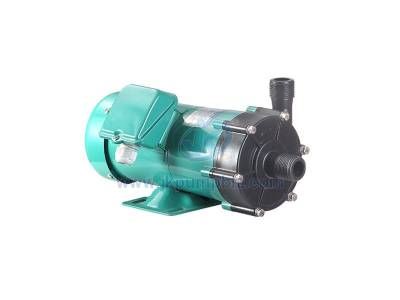Useful Information About Magnetic Drive Pumps
What is a magnetic drive pump?
Magnetic Drive Pumps, also commonly referred to as magnetic pumps, feature a set of magnets, one driving magnet on the outside of the pump chamber and another internal magnet. They are widely used in the chemical industry because their robust design makes them ideal for handling highly corrosive fluids.

Magnetic Drive Pumps
Magnetic drive pumps feature sealed chambers and a seal-less design, rather than a pump shaft through the housing, making them airtight and reducing the risk of liquid or vapor leakage. This is very beneficial for companies pumping expensive chemical products, as they cannot afford the risk of leakage into the plant environment. There are also many different variations of magnetic drive pumps, including centrifugal, regenerative turbine, vane and OEM, which work in conjunction with the benefits of magnetic drive pumps.
How does a magnetic drive pump work?
Magnetic drive pumps work by using two magnets connected in series to drive liquid through the pump:The first magnet is attached to the motor shaft by using a specialized glue, or held in place by set screws. The second magnet is encapsulated in a high grade thermoplastic or metal and is located inside the pump. These two magnets are separated by a housing that will also encase the media being pumped. When power is supplied to the motor, the rotation of the motor shaft causes the connected external magnets to rotate. The different polarities of the magnets result in synchronous rotation of the internal magnet and the external drive magnet. This internal magnet is coupled to the impeller inside the pump, which then pumps the liquid.
Advantages of magnetic drive pumps
1. The leak-proof design means that with proper operation there will never be any dangerous chemical spills or expensive product wastage.
2. Reliable and very low maintenance due to its simple design.
3. the coupling is magnetic, so no motor/pump alignment procedure is required.
4. The design complies with the strict environmental and safety objectives normally required by many regulations.
5. Fewer working parts, longer working life, and easier pump stripping.
Disadvantages of magnetic drive pumps
Best suited for clean liquids - not recommended for liquids containing solids
May use a lot of electricity compared to standard centrifugal pumps
Applications for magnetic drive pumps
Chemicals - transferring a wide range of acids, bases, alcohols, solvents and other solids-free liquids
Surface preparation - conveying from tanks and vessels as well as circulation and treatment tanks
Food and beverage - pumping CIP detergents used to clean pipes and other food processing equipment
Photo Processing - Transferring photo development chemicals and incorporating them into processing machines
Machinery - Transferring oils, fats, lubricants, coolants, solvents and solid-free products
Water Handling - pumping samples, metering acids and bases for pH control
Hazardous and corrosive fluids - Handling and conveying fuels and other volatile fluids
Cryogenics - pumping fluids for equipment cooling, medical cooling, air conditioning, LNG
Magnetic Drive Pumps vs. Centrifugal Pumps
The main difference between magnetically driven Centrifugal Pumps and industrial centrifugal pumps is how the power and speed of their motors are transferred to the impeller. Magnetic drive means that the motor shaft is connected to a magnetic coupling with an impeller. The magnets mounted on the drive magnet and impeller/magnet assembly have different polarities, which means that as the motor shaft rotates, it forces the impeller magnet assembly to rotate within the pump worm housing. Since there is no physical connection between the motor shaft and the impeller assembly, the process fluid is retained within the pump head, thus ensuring leak-free operation.
On the other hand, like conventional centrifugal pumps, industrial centrifugal pumps have impellers that are directly connected to the motor shaft, which has a mechanical seal attached to protect the motor from process fluid intrusion. Although these pumps are very similar in many aspects of design and application, there are still some key differences to be aware of when selecting a centrifugal pump.
If you are looking for a reliable magnetic drive pump for your application, contact a Magnetic Drive Pump Supplier. We can help you find the ideal solution for your industry and environment, and can also provide custom pumps to help you meet your pumping operation requirements.









